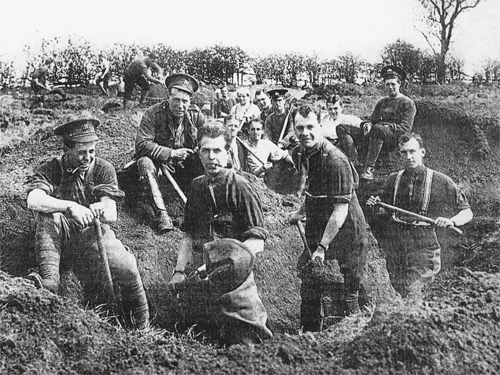
Lieutenant Arthur William Staples Pratte
10TH LINCOLNSHIRE REGIMENT
NEAR ANNIHILATION ON 1ST JULY did not necessary ensure that a battalion would have finished playing its part on the Somme. The 10th Lincolnshire Regiment went into action ahead of Billy Disbrey and the 11th Suffolks on that fateful day and were nearly destroyed by La Boisselle, suffering some 500 casualties in a day. It was unspeakably traumatic for a group that had been drawn from those with local ties, many of them associated with a single school.
On formation, the men hadn’t liked the sound of a Pals battalion. They were dubbed the Grimsby Chums instead and among their number was 22-year-old Arthur Pratte, a clerk and in his spare time an immensely talented violinist. He enlisted on 17th September 1914 and was immediately granted a commission, largely due to his seven years’ experience with the Grimsby Municipal College OTC as a colour sergeant. The school’s OTC was in camp in Staffordshire at the outbreak of war under the command of the headmaster and of Arthur’s father, William. They packed up and returned to Grimsby, determined to raise at least a company out of the college’s old boys. On the first evening, more than fifty indicated a willingness to join and in a matter of days they had some 200 men at their disposal, including teachers. The unit began to expand past this company and into a full battalion, thanks to posters put up about the town and when other schools contributed towards their number.
After months of training, months of living and working together, this close-knit band was in tatters on the evening of 1st July. Arthur and his fellow survivors were withdrawn to tents in a wood to the rear, where reinforcements arrived to replace the friends and family wiped out when they attempted to carry out their doomed offensive. Most of these new men were unfit or conscripts, and they dropped in in small groups from various regiments who could spare them, such as the Northamptons, the Middlesex or the South Staffords. The ties of community brought from Grimsby had been broken. The emotional impact of losing so many of their number, family, friends old and new, those whom they had come to know so well during the training and deployment, was shattering. The survivors with the battalion were still enveloped by grief at the beginning of August.
A little over a week after their divisional commander, General Ingouville-Williams, was killed they went back into the line. The whole area was gruesome; apparently some of the sandbags had been weighted with human parts. The commanders of Arthur’s battalion slept for three nights in a dugout that smelled bad, only to realise when they decided to clean it that they had been sleeping on the bodies of three dead Germans. The nearby woodland, what was left of it, was strewn with piles of corpses. ‘The smells, the noise, the unnatural shapes, and the bloody mess of the shell-torn bodies! Life at Bazentin was unpleasant!’
On 4th August Arthur Pratte and the rest of his battalion moved up to relieve the 11th Suffolks in the front lines to the north-east of Bazentin-le-Petit and small groups immediately went out bombing, although the weight of the enemy barrage was too much with which to contend. Arthur had been put in charge of A Company, the one that had originally been full of old boys from the Municipal College. On 6th August he was standing talking to another officer in a trench when a shell sailed into range and sprayed them both with shrapnel. Arthur was killed instantly; his friend died within half an hour. The colonel wrote to his father, who was by now with the 11th Lincolns, ‘Your boy was killed instantaneously,’ he told him, ‘Murphy dying a few minutes later. Your son has been with us since the beginning and I feel his loss very keenly. So few of our original officers are left.’ His company commander also had some kind words to say. ‘Your son was the essence of coolness and courage. I shall miss him as a friend.’
The battalion had been in the trenches just under a week and their stint had exacted a miserable toll on the survivors of 1st July and the strangers who had been sent up to make good their losses in the intervening month. Nearly 200 men were gone from the strength of the battalion again. The shadow of the Grimsby Chums, growing ever fainter, marched back out of the lines to trenches on the other side of Mametz Wood.
Arthur Pratte had married his sweetheart Annie, a teacher at the Municipal College, on 25th May 1916 before returning to France to embark on the Battle of the Somme. He had survived a mere two months after their wedding. Arthur originally lay where he fell. In 1934, he was recovered and identified by the Imperial War Graves Commission by his officer clothing and his regimental badges. His father had been dead some twelve years and never knew of his recovery, and his widow had been remarried for thirteen years. Arthur was finally laid to rest at London Cemetery and Extension, plot II.D.19 and when his mother passed away some eight years later it was in the knowledge that her boy rested in a proper grave in France.

Lieutenant Arthur Pratte (front row, third right). (Authors’ collection)